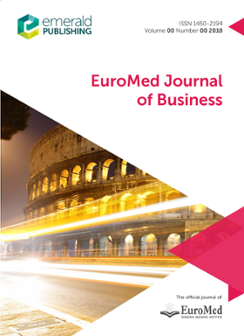利用增长溢出效应,在新冠肺炎疫情后的全球空间中驾驭加共体贸易关系
IF 3.9
Q2 BUSINESS
引用次数: 0
摘要
目的增长溢出现象是由于国内冲击、全球冲击和对外国或地区的冲击而产生的,这些都是通过特定的渠道传播的。本研究调查了加勒比共同体(加共体)经济体与其主要传统伙伴(包括欧盟(欧盟27国))和新兴贸易伙伴(如中国)之间的经济联系强度,以确定这些经济体之间相互依存所产生的溢出增长的存在和程度。该论文假设,可以利用这些溢出效应的存在来规划该地区在全球范围内一体化的未来。设计/方法论/方法基于现有的理论和实证文献,开发并使用了一个结构向量自回归(SVAR)模型来检验加共体经济体与其主要贸易伙伴(如美国、英国和欧盟27国)之间的经济联系强度,与中国等一些非传统伙伴并肩作战。国际货币基金组织(货币基金组织)和世界银行等机构广泛使用这种方法来描述经济体之间的经济联系。为此,该方法是根据2011年至2015年编制的国际货币基金组织溢出报告制定的。发现该模型表明,与美国、欧盟27国和英国作为传统贸易伙伴的持续深化一体化可能会产生积极的溢出效应,但与非传统贸易伙伴有意深化关系也会带来机遇,例如中国。当加共体被分为较发达国家和较不发达国家时,这一点就更加明显了。此外,从任何贸易伙伴的角度来看,例如欧盟27国的贸易伙伴,这项研究都是相关的和及时的,因为它有助于文献的景观,可以用于谈判贸易和一体化安排的参数。研究局限性/含义这项研究增加了关于评估加共体经济体深化一体化方向的文献,包括与选定的传统和非传统贸易伙伴的一体化,因为该地区在疫情后的全球空间中试点复苏。实际含义政策制定者可以利用这项研究的结果,利用经济溢出效应作为基础,确定随着该地区从新冠肺炎疫情中复苏,哪些贸易伙伴提供了最显著的增长效益,这也将有助于指导区域一体化。这一结果还意味着,随着时间的推移,加共体成员国出口情况的比较优势结构应该发生变化,以反映其贸易伙伴的进口情况。为此,这项研究可用于为加勒比区域各国在努力深化区域和国际一体化时各自的贸易和工业发展政策提供信息并更好地定位这些政策。从合作伙伴的角度来看,考虑到与加勒比经济体加深关系所带来的地理利益,传统贸易关系,如与欧洲国家的贸易关系,例如《加勒比经济伙伴关系协定》,可以更谨慎地加以利用。此外,这项研究也可以作为未来研究的出发点。原创性/价值这项研究是为数不多的将溢出效应作为后2019冠状病毒病时代重建经济增长战略的实证研究之一。这项研究为评估加共体经济体与选定的传统和非传统贸易伙伴深化一体化方向的文献增添了内容,因为该地区正在疫情后的全球空间中复苏。本文章由计算机程序翻译,如有差异,请以英文原文为准。
Leveraging growth spillovers to navigate CARICOM trade relations in the post-COVID-19 global space
PurposeThe phenomenon of growth spillover occurs because of domestic shocks, global shocks and shocks to a foreign country or region, and these are transmitted through specific channels. This study investigates the strength of the economic linkages between Caribbean Community (CARICOM) economies and its main traditional partners, including the European Union (EU-27), and emerging trading partners, such as China, with a view to determining the presence and extent of spillover growth which results from the interdependence among these economies. The paper hypothesizes that the presence of these spillovers can be leveraged to chart the future for the region's integration in the global sphere.Design/methodology/approachBased on the existing theoretical and empirical literature, a structural vector autoregressive (SVAR) model was developed and employed to examine the strength of the economic linkages between CARICOM economies and its main trading partners, such as the United States (US), the United Kingdom (UK) and the EU-27, alongside some of the non-traditional partners such as China. This method has been widely used by institutions, such as the International Monetary Fund (IMF) and World Bank, to profile economic linkages between economies. To this end, the methodology was formulated based on the IMF Spillover Reports which were produced from 2011 to 2015.FindingsThe model suggests that positive spillovers are likely to occur from continued deepened integration with the US, EU-27 and the UK, as traditional trade partners, but that opportunities also exist from a deliberate deepening of relations with non-traditional trade partners, for example, China. This becomes even more apparent when CARICOM is separated into categories consisting of more developed countries (MDCs) and less developed countries (LDCs). In addition, from the perspective of any trading partner, such as those in the EU-27, this research is relevant and timely as it contributes to the landscape of literature, which can be utilized for the purpose of negotiating parameters of trade and integration arrangements.Research limitations/implicationsThis study adds to the literature on evaluating the direction for deepened integration of CARICOM economies, both with selected traditional and non-traditional trade partners as the region pilots recovery in a post-pandemic global space.Practical implicationsPolicymakers can use the results of this study to leverage economic spillovers as a basis for determining which trade partners offer the most significant growth benefits as the region recovers from the COVID-19 pandemic and it will also assist in steering regional integration. This result also implies that over time, the comparative advantage structure of CARICOM member countries' export profile should change to reflect the import profile of its trade partners. To this end, this study can be used to inform and better position the respective trade and industrial development policies of countries in the Caribbean region as they attempt to deepen integration regionally and internationally. From the perspective of the partner, traditional trading relationships such as those which exist with European countries, such as the CARIFORUM-EU Economic Partnership Agreement, can be more deliberately utilized given the geographic benefits on offer with deepened relationships with economies in the Caribbean. Further, this research can also be a point of departure for future research.Originality/valueThis study is among the few empirical works that examine spillover effects as a strategy for rebuilding economic growth in the post-COVID 19 era. This study adds to the literature on evaluating the direction for deepened integration of CARICOM economies, both with selected traditional and non-traditional trade partners as the region navigates recovery in a post-pandemic global space.
求助全文
通过发布文献求助,成功后即可免费获取论文全文。
去求助
来源期刊

EuroMed Journal of Business
BUSINESS-
CiteScore
9.80
自引率
19.20%
发文量
61
期刊介绍:
The EuroMed Journal of Business (EMJB) is the premier publication facilitating dialogue among researchers from Europe and the Mediterranean. It plays a vital role in generating and disseminating knowledge about various business environments and trends in this region. By offering an up-to-date overview of emerging business practices in specific countries, EMJB serves as a valuable resource for its readers.
As the official journal of the EuroMed Academy of Business, EMJB is committed to reflecting the economic growth seen in the European-Mediterranean region. It aims to be a focused and targeted business journal, highlighting environmental opportunities, threats, and marketplace developments in the area. Through its efforts, EMJB promotes collaboration and open dialogue among diverse research cultures and practices.
EMJB serves as a platform for debating and disseminating research findings, new research areas and techniques, conceptual developments, and practical applications across various business segments. It seeks to provide a forum for discussing new ideas in business, including theory, practice, and the issues that arise within the field.
 求助内容:
求助内容: 应助结果提醒方式:
应助结果提醒方式:


